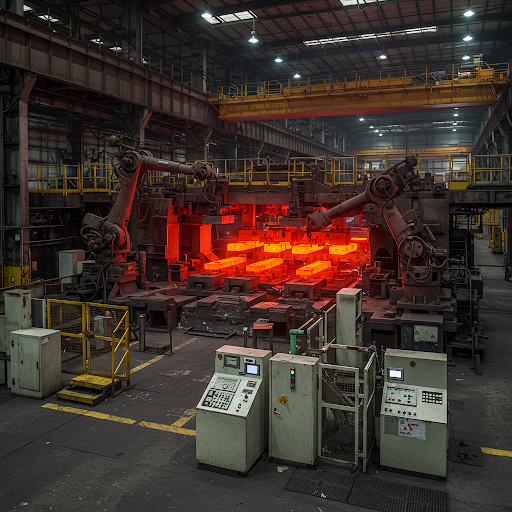Raw Material Handling
At Active Steel Forge, we recognize that the foundation of…

At Active Steel Forge, we recognize that the foundation of…

At Active Steel Forge, we offer advanced heating facilities designed…

Experience unmatched cutting precision and efficiency with our advanced cutting…

At Active Steel Forge, our advanced forging facilities offer unmatched…

At Active Steel Forge, we specialize in providing advanced heat…

Experience unmatched precision and superior quality with our advanced CNC…

7 min Read
Steel forging is a time-tested manufacturing process that involves shaping metal using compressive forces. Known for its strength, durability, and precision, steel forging plays a critical role in industries such as automotive, aerospace, and heavy machinery. This comprehensive guide explores the forging process, its benefits, and why it remains a preferred method for producing high-quality components.
The forging process begins with selecting high-quality steel. Various steel alloys are used based on the required mechanical properties, including carbon steel, alloy steel, and stainless steel. The right choice of material ensures the final product meets industry standards for strength and durability.
Once the raw material is chosen, the steel is heated to a precise temperature range (usually between 1,000°C and 1,300°C). Heating makes the metal malleable, allowing it to be shaped without breaking. This step is crucial to achieving the desired mechanical properties in the final product.
The actual forging process involves shaping the heated metal using high-pressure dies or hammers. Depending on the application, different forging techniques are used:
After forging, the component is cooled gradually to prevent stress and cracking. Additional heat treatment processes such as quenching, tempering, or annealing may be applied to enhance strength, hardness, and toughness.
To achieve precise dimensions and surface finishes, forged components undergo CNC machining and finishing processes. This step ensures that the product meets tight industry tolerances and performs optimally in its application.
Forged steel components exhibit enhanced mechanical properties compared to cast or machined parts. The grain structure aligns with the shape of the part, resulting in improved impact resistance, fatigue strength, and wear resistance.
Modern forging techniques combined with CNC finishing ensure that each component maintains high accuracy and repeatability. This is crucial for industries requiring precision, such as aerospace and automotive manufacturing.
Although forging requires initial tooling costs, the process reduces material waste, lowers machining time, and increases production efficiency, making it a cost-effective solution for large-scale manufacturing.
Forged components are free from internal voids or porosity, which can weaken materials over time. As a result, forged steel parts offer long-term reliability even in high-stress applications.
Steel forging is highly adaptable to various shapes, sizes, and specifications. Manufacturers can create customized components tailored to specific industrial needs.
Steel forging is used across multiple industries due to its superior mechanical properties. Some common applications include:
At Active Steel Forge, we specialize in manufacturing high-quality forged and machined components. With a state-of-the-art facility, a dedicated team, and cutting-edge technology, we deliver top-tier products for diverse industrial applications. Our commitment to quality ensures that each forged part meets stringent industry standards.
Steel forging remains one of the most reliable and efficient manufacturing processes for producing strong and durable components. Its ability to enhance material properties, improve performance, and provide cost-effective solutions makes it a preferred choice across multiple industries. Whether in automotive, aerospace, or industrial machinery, steel forging continues to shape the future of precision engineering.
Get in touch with our experts today
